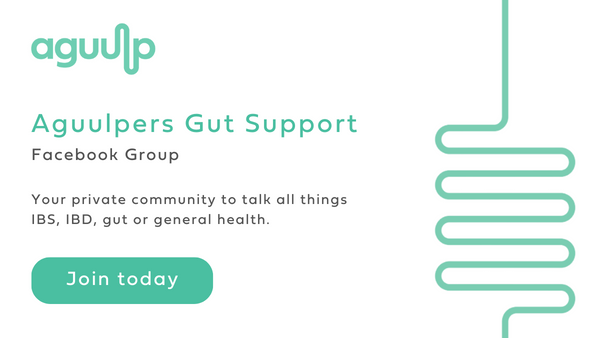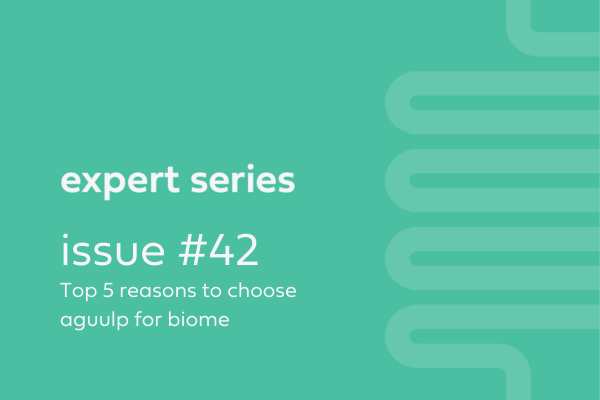How to heal gut inflammation
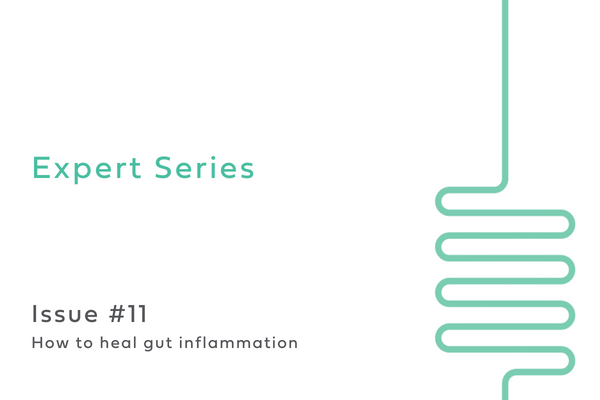
Gut inflammation is one of the topics we’re asked about most, from what it feels like to how to heal it, as well as how to reduce inflammation in the gut. Want to know more? Keep reading to find out everything you need to know about how to heal gut inflammation.
What is gut inflammation?
In order to understand how gut inflammation affects the body, it is important to understand the basics of what it is and how it occurs in the first place.
Inflammation is caused by a reaction at cellular level by the immune system in which inflammatory chemicals are released in response to infection, allergies, medications and injury (damage to cells and/or tissue). Inflammation can also be caused by lifestyle factors such as diet, environmental contaminants (pollution), smoking, excessive sun exposure and even stress.
Inflammation as a whole doesn’t necessarily mean a bad thing. For example, small amounts of well-controlled inflammation is a good thing, like when we see our skin redden and cause swelling following a cut or abrasion and when we feel a rise in body temperature; this signals immune cells to fight infection. However, internal or regular, long-term inflammation has been linked to a number of health conditions and therefore may be a sign that there are some underlying health issues.
Intestinal or ‘gut’ inflammation can present itself in many forms. For example, inflammation can occur to the lining of the gastrointestinal (GI) tract: a condition known as gastritis which occurs in response to a potential bacterial infection or irritation due to certain foods, alcohol or medications.
Gut inflammation that alters or damages the lining of the bowel can also occur, which is believed to originate from intestinal dysbiosis (microbial imbalance). This damage and other sources of irritation can lead to the tight junctions of the intestinal wall to widen, allowing the passage and absorption of toxins and undigested food particles into systemic circulation which is known as ‘leaky gut syndrome’– a condition where the intestinal barrier is compromised. Conditions such as these are known as Functional Gastro-Intestinal Disorders (FGIDs) where medical testing has found no clear organic cause. Other examples of these are conditions such as Dyspepsia and Irritable Bowel Syndrome (IBD).
One the other hand, conditions such as Ulcerative Colitis and Crohn’s , are medically diagnosed inflammatory diseases of the bowel. Other medically diagnosed conditions affecting the GI tract which have an inflammatory component to them include Coeliac Disease and Diverticulitis. Whilst the cause of inflammatory bowel diseases such as these remains unclear, research suggests they may also be associated with increased intestinal permeability (leaky gut).
Common gut inflammation symptoms
Gut inflammation symptoms can range from low grade fever to gut pain and disturbance, and an inability to absorb nutrients. Since gastro-intestinal symptoms can be similar for IBD and FGID, differentiating between the two can be quite difficult and would usually require medical diagnosis. Typically, common gut inflammation symptoms may include (but are not limited to):
- abdominal pain
- urgency, constipation and/or diarrhoea
- unexplained weight loss
- loss of appetite
- fatigue
- blood in the stool
*The presence of blood in the stool, especially when accompanied with any of the above listed symptoms should be investigated by a medical professional.
What causes gut inflammation?
It is believed that the diet plays a significant contributing factor to all inflammatory disorders of the digestive system. The average modern western diet contains many inflammatory foods that are high in sugar, highly processed and contain high amounts of saturated, refined or trans fats and artificial sweeteners. So, what foods inflame the gut?
Foods that contain high amounts of sugar are particularly pro-inflammatory as sugar causes a huge rise in various cytokines (messenger molecules of the immune system) that cause inflammation. Certain foods are also known to be quite irritating to a sensitive or inflamed digestive tract, such as spicy foods, alcohol, and dairy. There is also a theory that a group of foods known as the ‘night shade family’ which includes tomatoes, potatoes, aubergines and peppers may trigger gut inflammation in certain people, however this is yet to be scientifically proven.
Food sensitivities are also often implicated in inflammatory conditions due to the immune response that occurs, leading to inflammation and the potential for increased gut permeability (leaky gut) to develop. Gluten is a perfect example of this, not only is it considered a pro-inflammatory food and a common allergen, it is also believed to increase gut permeability due to the overproduction of zonulin – a protein that regulates gut permeability. When the body produces too much zonulin, gaps are formed within the tight junctions of the intestinal wall leading to compromised gut integrity.
What foods can help gut inflammation?
On the other hand, there are certain foods that are considered to be anti-inflammatory and even foods that are believed to have a potential healing effect on the gut. If you’re looking for advice on how to heal gut inflammation, start with a change in your diet.
In order to minimise gut inflammation, the focus of the diet should be based around whole foods; avoiding refined, processed, and fried foods which are inflammation aggravators.
Examples of healthy whole foods include (but are not limited to):
- whole grains such as millet, buckwheat, quinoa, kamut, teff
- oats, black and wild rice
- dark green leafy vegetables
- oily fish
- lean white meats such as turkey and chicken
- nuts and seeds
- cold pressed oils such as olive, flaxseed and walnut oils
- Green vegetables contain a phytonutrient called diindolylmethane (DIM) which has been shown to have anti-inflammatory effects.
How to heal gut inflammation through your diet
Here are some other ways that your diet may affect symptoms of gut inflammation, including foods that you might want to consume more of:
Essential fatty acids found in omega 3: The richest sources are all types of oily fish and also fish liver oil. Some plant foods also provide omega 3, such as flaxseeds, chia seeds, pumpkin seeds, hemp seeds and walnuts but the type of omega in these foods is in a less active form and so provides less health benefits to that provided by oily fish/ fish oil.
Increase fruits: – Berries such as blueberries, blackberries, strawberries, raspberries, cherries and grapes -contain a type of phytonutrient called anthocyanins which exert anti-inflammatory effects. Pineapple and papaya also contain active constituents which have anti-inflammatory effects.
Spices and herbs: Garlic, ginger, turmeric and chillies have powerful antioxidant and anti-inflammatory properties which help support the immune system and fight inflammation in the body. -Including more spices in your meals is an alternative means to supplements to reap the benefits of these spices for reducing inflammation.
Probiotic-rich foods: Foods which have a prebiotic effect in the gut such as sauerkraut, kimchi, kefir, kombucha help to encourage the growth of healthy bacteria in the gut which is important for immunity and gut integrity.
For those with a sensitive or inflamed digestive tract, certain foods can be further irritating, such as dairy and chilli. In these circumstances, focusing on easily digestible, soothing foods such as soups, bone broths, and smoothies, can be beneficial to help calm and sooth the digestive tract.
How to heal gut inflammation: lifestyle changes to make
Aside from making changes to your diet, there are other lifestyle changes to consider to try to relieve any gut inflammation symptoms you are susceptible to. These include:
Adequate and good quality sleep: Lack of sleep can result in a drop in body temperature and weakening of the immune system. Avoid the use of blue light (TV, phone, laptop etc) near bedtime since these act as a stimulant to the brain and can impact the ability to fall asleep and can affect sleep quality.
Exercise: has been shown to help the body produce naturally occurring anti-inflammatory defences. Weight management is also vital as extra body fat produces pro-inflammatory compounds that may lead to gut inflammation.
Reduce exposure to environmental toxin: Environmental toxins such as plastics, heavy metals, pesticides and antibiotics cause oxidative stress and inflammation in the body, in addition to disrupting the gut microbial balance. It is advisable to opt for organic foods where possible, avoid storing and cooking foods in plastics and packaging that contain Bisphenol A (known as BPA), and using natural skincare and cleaning products where possible.
Taking supplements and nutrients: Specific nutrients have been shown to help support gastro-intestinal function and can therefore help to minimise gut inflammation:
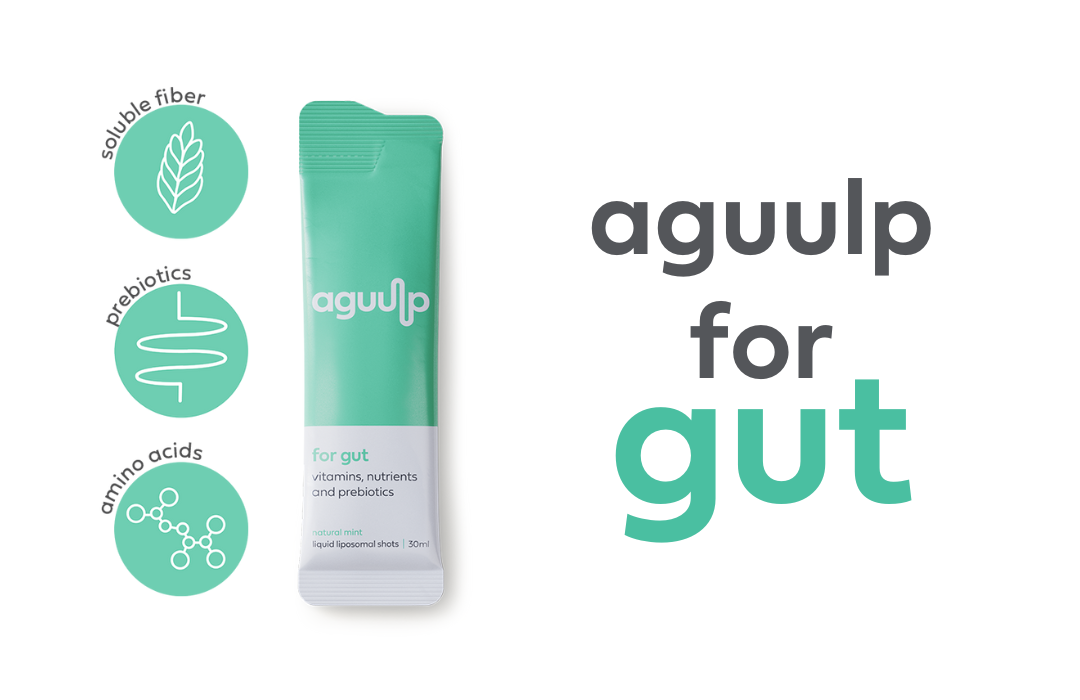
Aguulp for Gut supplement is packed with beneficial nutrients that have shown to help support gut function and reduce gut inflammation, including:
- Glutamine: the most abundant non-essential amino acid in human muscle. Glutamine has been shown to protect against inflammation, improve intestinal barrier function and help to reduce intestinal permeability.
- Collagen: low levels have been associated with inflammatory bowel disease and digestive imbalances. One of the key amino acids in collagen is glutamine (as mentioned above).
- Zinc: encourages healing and reduces gut inflammation. Zinc has also been shown to reduce gut permeability via actively having a positive effect on tight junctions.
- Antioxidants: such as vitamin C can increase collagen synthesis and can help reduce inflammation.
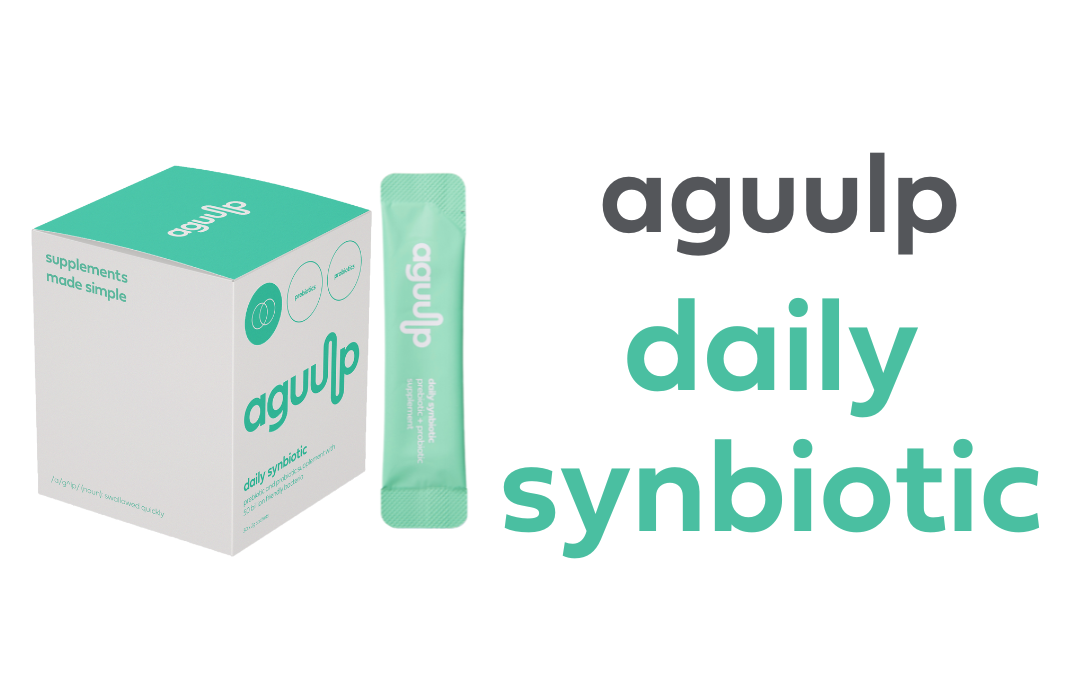
Aguulp Daily Synbiotic: Our pre and probiotic supplement contains a high number of both pre and probiotics. Probiotics have been shown to be beneficial in reducing intestinal inflammation and gut permeability.
Having the right types of bacteria in the gut is important since bacteria attach themselves to the mucus layer of the intestinal barrier and unhealthy bacteria can irritate and inflame the gut wall leading to compromised gut integrity.
Healthy gut bacteria also influence cytokine production and increase short-chain fatty acids such as acetate, lactate, propionate and butyrate which help to keep the gut environment healthy by regulating immunity and inflammation in the intestines. Read more about the role of good gut bacteria vs bad gut bacteria, and check out our full range of gut health supplements.
Use the code ‘JUMPSTART20’ for 20% off our Daily Synbiotic!
Want to know more about gut inflammation?
If you have any questions regarding our gut supplements, gut health and mental health, or even general health, send us a message on [email protected] and one of our in-house experts will be more than happy to help. We also have our very own Aguulp Gut Support Facebook group, where you can discuss gut, IBS, or general health problems freely without judgement. You can also sign up to our Aguulp gut health newsletter.
References
Quan et al. Effect of glutamine on change in early postoperative intestinal permeability and its relation to systemic inflammatory response. World J Gastroenterol. 2004. 10 (13): 1992-4
Rapin J. R, Wiernsperger N. Possible links between intestinal permeablity and food processing: a potential therapeutic niche for glutamine. 2010. Clinics:65.
Rapin et al. Possible Links between Intestinal Permeability and Food Processing: A Potential Therapeutic Niche for Glutamine. Clinics. 2010; 65(6).
Skrovanek S et al. Zinc and gastrointestinal disease. World Journal of Gastrointestinal Pathophysiology. 2014;5(4):496-513.
Moura FA, et al. Antioxidant therapy for treatment of inflammatory bowel disease: Does it work? Redox Biology. 2015;6:617-639
Banasiewicz T, Domagalska D, et al. Determination of butyric acid dosage based on clinical and experimental studies – a literature review. Prz Gastroenterol. 2020; 15(2): 119-125
Chang H K. Control of lymphocyte functions by gut-microbiota derived short-chain fatty acids. Cellular & Molecular Immunology 18, 1161-1171 (2021)
Fasano A. Intestinal permeability and its regulation by zonulin: diagnostic and therapeutic implications. Clin Gastroenterol Hepatol. 2012; 10:1096-1100.
Malesza IJ, Malesza M, Walkowiak J, Mussin N, Walkowiak D, Aringazina R, Bartkowiak-Wieczorek J, Mądry E. High-Fat, Western-Style Diet, Systemic Inflammation, and Gut Microbiota: A Narrative Review. Cells. 2021 Nov 14;10(11):3164. doi: 10.3390/cells10113164. PMID: 34831387; PMCID: PMC8619527.
Christ A, Lauterbach M, Latz E. Western Diet and the Immune System: An Inflammatory Connection. Immunity. 2019 Nov 19;51(5):794-811. doi: 10.1016/j.immuni.2019.09.020. PMID: 31747581.
Martel J, Chang SH, Ko YF, Hwang TL, Young JD, Ojcius DM. Gut barrier disruption and chronic disease. Trends Endocrinol Metab. 2022 Apr;33(4):247-265. doi: 10.1016/j.tem.2022.01.002. Epub 2022 Feb 9. PMID: 35151560.
Tomasello G, Mazzola M, Leone A, Sinagra E, Zummo G, Farina F, Damiani P, Cappello F, Gerges Geagea A, Jurjus A, Bou Assi T, Messina M, Carini F. Nutrition, oxidative stress and intestinal dysbiosis: Influence of diet on gut microbiota in inflammatory bowel diseases. Biomed Pap Med Fac Univ Palacky Olomouc Czech Repub. 2016 Dec;160(4):461-466. doi: 10.5507/bp.2016.052. Epub 2016 Oct 26. PMID: 27812084.
Calder PC. Omega-3 fatty acids and inflammatory processes: from molecules to man. Biochem Soc Trans. 2017 Oct 15;45(5):1105-1115. doi: 10.1042/BST20160474. Epub 2017 Sep 12. PMID: 28900017.
Simopoulos AP. Omega-3 fatty acids in inflammation and autoimmune diseases. J Am Coll Nutr. 2002 Dec;21(6):495-505. doi: 10.1080/07315724.2002.10719248. PMID: 12480795.
Michielan A, D’Incà R. Intestinal Permeability in Inflammatory Bowel Disease: Pathogenesis, Clinical Evaluation, and Therapy of Leaky Gut. Mediators Inflamm. 2015;2015:628157. doi: 10.1155/2015/628157. Epub 2015 Oct 25. PMID: 26582965; PMCID: PMC4637104.
Kozłowska A, Dzierżanowski T. Targeting Inflammation by Anthocyanins as the Novel Therapeutic Potential for Chronic Diseases: An Update. Molecules. 2021 Jul 20;26(14):4380. doi: 10.3390/molecules26144380. PMID: 34299655; PMCID: PMC8304181.
Kizaki T, Sato S, Shirato K, Sakurai T, Ogasawara J, Izawa T, Ohira Y, Suzuki K, Ohno H. Effect of Circadian Rhythm on Clinical and Pathophysiological Conditions and Inflammation. Crit Rev Immunol. 2015;35(4):261-75. doi: 10.1615/critrevimmunol.2015014925. PMID: 26757391.
Frodermann V, Rohde D, Courties G, Severe N, Schloss MJ, Amatullah H, McAlpine CS, Cremer S, Hoyer FF, Ji F, van Koeverden ID, Herisson F, Honold L, Masson GS, Zhang S, Grune J, Iwamoto Y, Schmidt SP, Wojtkiewicz GR, Lee IH, Gustafsson K, Pasterkamp G, de Jager SCA, Sadreyev RI, MacFadyen J, Libby P, Ridker P, Scadden DT, Naxerova K, Jeffrey KL, Swirski FK, Nahrendorf M. Exercise reduces inflammatory cell production and cardiovascular inflammation via instruction of hematopoietic progenitor cells. Nat Med. 2019 Nov;25(11):1761-1771. doi: 10.1038/s41591-019-0633-x. Epub 2019 Nov 7. PMID: 31700184; PMCID: PMC6858591.
Murata M, Kang JH. Bisphenol A (BPA) and cell signaling pathways. Biotechnol Adv. 2018 Jan-Feb;36(1):311-327. doi: 10.1016/j.biotechadv.2017.12.002. Epub 2017 Dec 8. PMID: 29229539.
